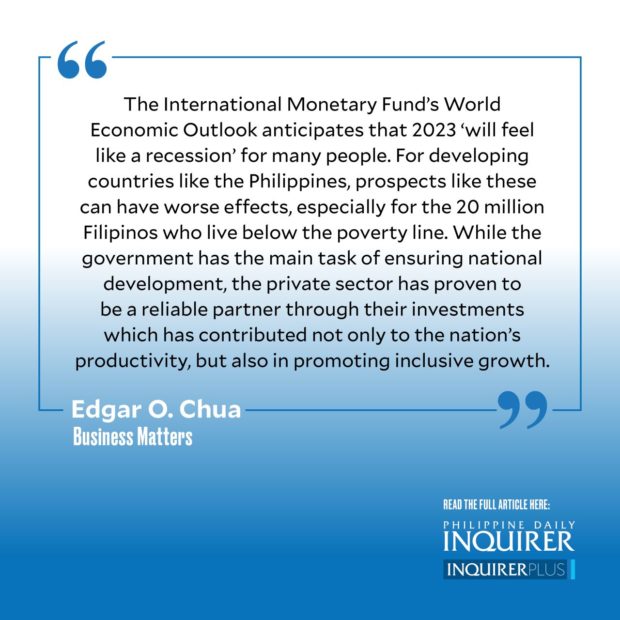Business needs to step up for shared prosperity
The COVID-19 pandemic in 2020, followed by the Ukraine-Russia conflict in early 2022, has underlined that the prospects for global growth are understandably grim. The International Monetary Fund’s World Economic Outlook anticipates that 2023 “will feel like a recession” for many people. For developing countries like the Philippines, prospects like these can have worse effects, especially for the 20 million Filipinos who live below the poverty line.
While the government has the main task of ensuring national development, the private sector has proven to be a reliable partner through their investments which has contributed not only to the nation’s productivity, but also in promoting inclusive growth.
There are three key areas in which the private sector should channel their efforts to achieve prosperity, address poverty, and boost job creation despite the bleak outlook for 2023.
Education and upskilling. We must invest in human capital development. An improved education system, as well as reskilling and upskilling, are forms of human capital investments.
The need to reskill and upskill our workers is urgent to ensure that the negative effects of the Fourth Industrial Revolution are mitigated and its opportunities maximized.
How can the private sector help? First, by participating and scaling the apprenticeship program. Once the apprenticeship bill is passed and the training period is increased, the private sector can and should participate in training workers to gain practical experience and skills they can use for employment. Second, by moving away from the “college degree-centric” perspective. Not all Filipinos can afford a college education, and there are many skill-based jobs that do not require college degrees. Thus, the private sector must start hiring workers based on their skills without requiring tertiary degrees.
Advocating business environment supportive of MSME growth. Businesses, especially MSMEs, constantly encounter bureaucracy, red tape, and corruption. The ease of doing business law has improved business transactions and increased digitization, but improvements in implementation are still needed.
We, in the private sector, can help by continuously identifying areas that need addressing, and advocating for the needed reforms, e.g., Ease of Paying Taxes bill, Use of Digital Payments Act, and the E-Governance Act.Sectoral reforms. The private sector can also help in these three growth areas that can increase the quality of jobs and growth: agriculture, manufacturing, and energy.For agriculture, which is so crucial to improve food security and reduce food prices, businesses can help by investing in food processing facilities to give farmers access to key supply chains without the middleman. Another way is to assist in increasing and improving training, especially on greater use of technology, and providing financial assistance to farmers. Note that the highest levels of poverty are also in the agriculture sector, which has an aging workforce.
For advanced manufacturing, opportunities lie in shifting toward high value-added activities and creating a manufacturing innovation ecosystem. The Makati Business Club (MBC) is working with a USAID-Unilab Foundation program aimed at attracting investors that would introduce new technologies and innovation in this sector. It is also focused on creating a pipeline of highly skilled and adaptive workforce to meet the evolving requirements of the advanced manufacturing sector.
For energy, the Philippines is currently facing a power crisis due to supply constraints, increasing demand, and lag in installing necessary power infrastructure. The business sector and government need to seamlessly coordinate plans and projects toward addressing these constraints. This can be done by institutionalizing the Energy Investment Coordinating Council, which will provide the private sector with a formal platform to voice out their concerns and pitch initiatives, like diversifying the Philippine energy mix, and fast-tracking transmission infrastructure and other policy reforms.
According to the Organization for Economic Cooperation and Development, “doing business and doing well are not mutually exclusive. Profit-seeking and sustainability objectives can align.”
MBC, along with other business organizations, launched the Covenant for Shared Prosperity in 2020, which calls on companies to “collectively mobilize” their human, technical, and financial resources to address “gross inequality” in society, and achieve shared prosperity.
As we enter another potentially challenging year, we, in the business community, need to step up on this commitment to truly elevate the lives of stakeholders, especially the marginalized sector of society.
——————
Edgar Chua is CEO of Amber Kinetics and chair of MBC.
——————
Business Matters is a project of the Makati Business Club (makatibusinessclub@mbc.com.ph).





















